#earth-based judaism
Text
support my work!
If you're interested in contemporary tekhines, witchy or earth-based judaism, supporting multicultural queer jews, a lot of pomegranate focused art, scaffolding for determining your own torah, eco-kashrut, stickers, printables, or tikkun olam then this is for you!
I've made a Tu bShvat haggadah and a 5783 omer counter and a 5784 counter, and am adding feminine hebrew to my haggadah. I am working on a long term project of poetically translating brachot and prayers. I also maintain a global jewish perinatal practices database, always available for free. Please take a look!
ko-fi (printables, tekhines)
redbubble (stickers, cards, pins, magnets)
instagram (general musings)

#jewish#judaism#jewitch#jewish magic#jewish art#haggadah#haggadot#omer counter#omer#counting the omer#tu bshvat#tu bishvat#tu bishevat#stickers#tekhine#support an artist#earth based judaism#earth-based judaism#queer jews#jewblr#jewish stuff#pomegranates#jumblr
20 notes
·
View notes
Note
wait you don’t have to believe in an anthropomorphic god in judaism? could you explain a bit if that’s alright?
my favorite way to explain the way jews feel about god is with the story of the oven of akhnai. basically, the sages are arguing about the halachic status of a new type of oven. there's a lot of debate and miracles to try to prove who's right, and eventually one of them is like "ok dude if ur right then god themself will say ur right." and god's like "ya ur right" but the other guy's like "fuck off god this isn't ur business." the torah is not in heaven. it's down on earth with us. we are the ones responsible for our laws and ethics.
a lot of jews i know don't believe in an anthropomorphic god. one of my rabbis believes that god is the oneness of the universe, which is an interpretation i really love. another one i love is that god is in the things we haven't been able to figure out yet, the laws of physics that don't make sense to us yet, the corners of the universe we haven't been able to reach, and the more we figure out the more we know god.
this is very different than what a lot of folks will recognize if they had a christian upbringing, because the christian god is very much seen as an authority figure, someone who is actively granting forgiveness and changing things on earth. so even for jews who do believe in something closer to what most gentiles will recognize as god, our priorities and relationship with god are still very different.
also slightly unrelated but i feel it's important to note that jewish laws were based on a time where we were a nation that was self governing, whereas with christian theology it was intended to be able to be integrated into other cultures and existing judicial systems easily because their goal is proselytizing, so god is their One Uniter. whereas there have been many services i've attended where the rabbis literally did not mention god once unless it was during a prayer or reading, which shocks a lot of ppl lmao.
3K notes
·
View notes
Text
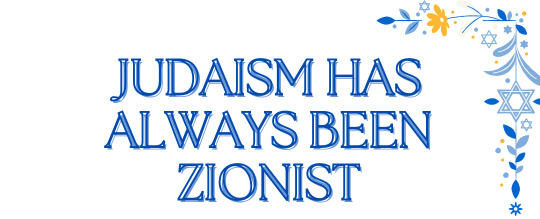
Judaism is a native religion and identity, so like all indigenous religions, it has ALWAYS sanctified the bond between the tribe and its ancestral land:
* Jews, no matter where around the world we are, pray in the direction of the Hebrew Temple in Jerusalem.
* Israel, Jerusalem, and Zion are mentioned in the Hebrew Bible hundreds of times, often in connection to the importance of the bond between the land and the Jewish people.
* The Hebrew calendar and Jewish holidays are based on the agricultural year as experienced in the Land of Israel. For example, we celebrate Shavu'ot, the Jewish festival of the harvest, during the Hebrew month of Sivan, which is roughly around the Gregorian month of June. In Australia, June is the rainiest month of the year, with severe temperature drops, absolutely not the right time for the harvest. But Australian Jews still celebrate Shavu'ot at the same time as all other Jews, around June. Because we ALL honor and preserve the agricultural cycle of our ancestors in Israel.
* Many Jewish prayers express a desire to return to Israel, for example with the phrase, "Next year in Jerusalem."
Here's a greeting card, drawn at Linz, a Nazi concentration camp in Austria, which was turned into a DP (displaced persons) camp at the end of the war. The card features the above three Hebrew words (you can see the freed prisoners of the camp on the left, heading towards a land with palm trees on the right, with one of the buildings having a Star of David on top):

* The holiest site for Jewish people in the entire world is the thousands of years old Temple Mount in Jerusalem, where the Jewish temple stood, in Israel.
* Several Jewish holidays explicitly celebrate the Zionist notion, meaning the importance of the bond between the Jews and the Land of Israel. Hanukkah is a celebration of the native Jews fighting off the Greek occupying forces, and re-establishing Jewish sovereignty in Israel, and the freedom from religious persecution this allowed Jews, by re-dedicating the Hebrew Temple in Jerusalem to Jewish worship, after it was defiled by the Greeks (including by re-lighting the Temple Menorah). Passover celebrates the deliverance of the Jews from Egypt, and the start of their journey back home, to their ancestral land in Israel, with the Passover meal ceremony including thanking God for bringing Jews back to Israel, and for building the Temple in Jerusalem for them.
* The language of the Jewish people is Hebrew, which is the last Canaanite language, the last of the languages spoken by the native peoples of Israel. Hebrew is specifically tied to the geography of Israel. For example, in the Bible, the Hebrew word for "west" is also the Hebrew word for "sea," because Israel's western border is the Mediterranean Sea. Similarly, the Hebrew word for "south" is also the Hebrew name of the desert that makes up the southern part of Israel, the Negev. Every Jewish language, which developed in the diaspora (such as Yiddish and Ladino), features words borrowed from Hebrew.
Here's an Israeli poster made in 1949, honoring "Sea Day" and featuring a part of a biblical verse (Genesis 28, verse 14): "And your seed shall be as the sand of the earth, and you will spread to the sea and to the east, to the north and to the Negev, and blessed in you and in your seed will be all the families of the Earth."

* Among the 613 Jewish mitzvahs, religious decrees that Jews must observe, one explicitly states that whenever possible, Jews should strive to live on their ancestral land in Israel. This is called in Hebrew, "mitzvat yishuv Eretz Yisrael."
* Among the 613 mitzvahs, there are 26 mitzvahs that can only be observed while living in the Land of Israel. These are called in Hebrew, "mitzvot ha'tluiot ba'aretz."
* Jewish homes have included for centuries a decorative piece hung on the eastern wall, and called "mizrach" (the Hebrew word for "east"), because that was the direction of Israel to most Jews. It usually included a biblical verse in Hebrew, often one that either mentions the east, Israel or Jerusalem, and also illustrations of Jerusalem or Israel.
Here's an 18th or 19th century mizrach from Germany:
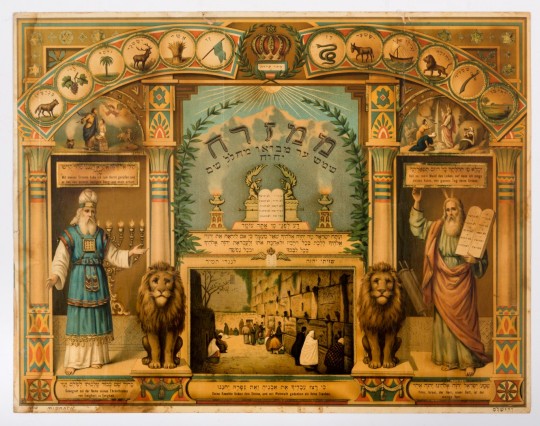
* In Jewish synagogues, especially in Europe, the eastern wall was the most important one, because it was the one facing Israel. This wall was called, "kotel ha'mizrach" which means in Hebrew "the wall of the east."
* Oh, but the word "kotel" refers specifically to the walls of the Temple Mount. For example, the Western Wall, the only one of the Temple Mount's four walls accessible to Jews for centuries (and therefore the plaza in front of it became the second holiest place to Jews, after the Temple Mount itself) is called in Hebrew, "ha'kotel" (the wall). So why would a synagogue wall be referred to as "kotel" as well? Because every Jewish synagogue is called "mikdash me'at," a lesser temple. Every Jewish synagogue is a reminder and placeholder for the destroyed Jewish Temple in Jerusalem.
* Accordingly, many Jewish synagogues feature reminders of the Beit Ha'Mikdash (the Hebrew Temple). For example, this holy ark, from a synagogue in Romania, which survived the Holocaust, and is today presented at Yad Vashem (Israel's national Holocaust museum), includes two pillars on its sides, a reminder of the Temple in Jerusalem's pillars believed to have been build by King Solomon. The holy ark's pillars are named exactly like the Temple's two pillars, Boaz and Yachin. This holy ark also features two hands, they're meant to be the high priest's, while he's performing the priestly blessing, an ancient Jewish ceremony that was conducted on the steps of the Temple in Jerusalem.

* In fact, over the centuries, one of the most prominent Jewish symbols is the menorah, which is a reflection of the candelabra eternally lit in the Jewish Temple in Jerusalem.
The Temple Menorah being stolen by the occupying Romans, as seen on the Titus Arch in Rome:
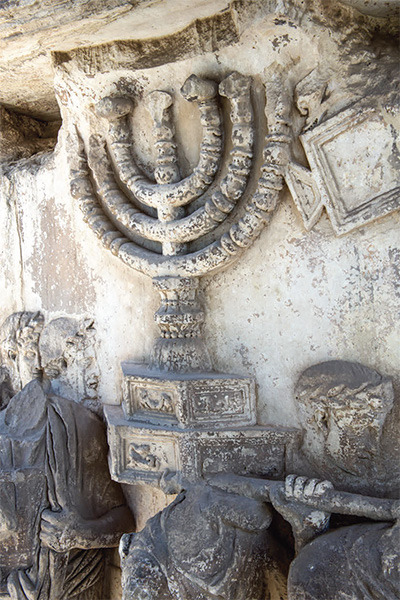
The menorah as incorporated into jewelery, as a Jewish symbol, goes back thousands of years:
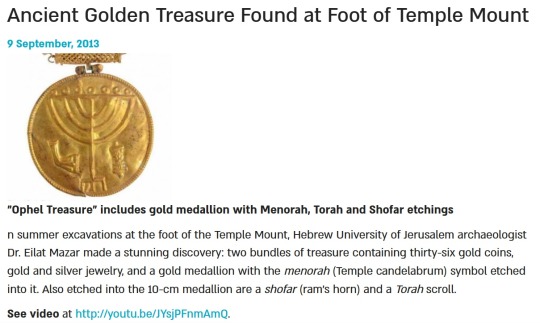
* For centuries, Jews created Jewish art and culture, which expressed Zionist longing. For example, the Sephardi doctor, philosopher and poet Rabbi Yehuda Ha'Levi writes what is maybe the most famous of the "Zion poems" while living in Islamic-occupied Spain: "My heart is in the East, and I am at the end of west / How shall I taste what I eat, and how should it be an enjoyable taste? / How shall I repay my vows and commitments, while / Zion is in the ropes of Edom, and I am in the bonds of Arabia? / It would be easy for me to leave all of the good of Spain, just like / It would be precious to me to witness the ashes of a ruined temple."
* In 1140, Rabbi Yehuda Ha'Levi finally fulfilled his wish, and boarded a ship for the Land of Israel. We don't know what happened to him, but the phrasing in a Hebrew letter, written by Jews who knew him, and found in Egypt, implies that he was murdered. For almost 2,000 years, it was dangerous for Jews to try and return to Israel, and it certainly wasn't possible on the scale of a national movement. Jews knew it was dangerous. And yet for centuries, despite that, individual Jews like Rabbi Yehuda Ha'Levi persisted in attempting this return. This is a part of Jewish history. It's not just that there was a small number of Jews, who managed to remain in Israel despite the repeated expulsions and massacres of Jews from our land, it's also that there was a small number of Jews who dared attempt the return to Israel continuously, over centuries, and neither of these things would have happened had Judaism not been Zionist. Always.
* For centuries, every Jewish wedding includes a part, where the groom recites an oath of loyalty and longing for Jerusalem. The text itself is taken from the Bible, from the second part of Psalms 137: "If I forget you, Jerusalem, let my right hand forget itself, let my tongue be glued to the roof of my mouth if I do not remember you, if I do not raise Jerusalem at the height of my joy."
* For centuries, every Jewish wedding included a symbolic reminder of the destruction of the Temple in Jerusalem, and our ancestors' following expulsion from the Land of Israel, by breaking a cup made of glass.
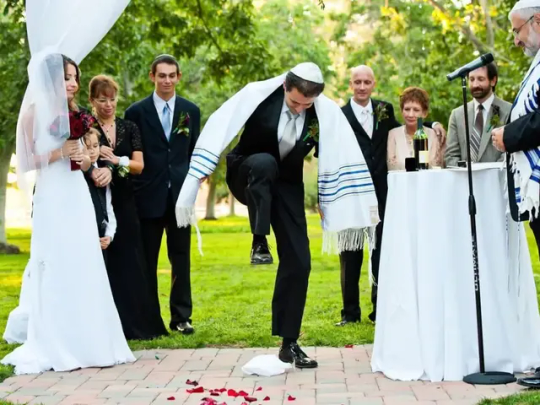
* For centuries, many Jewish homes featured an unfinished patch, as a similar reminder. I'm a secular Jew, but my real life bestie is religious, and her house has a hole in the eastern wall, intentionally left there.
* In fact, the destruction of the Temple, and the following expulsion of the Jewish people from Israel, is SUCH a traumatic and significant event for the Jewish faith, that there is a religious national day of mourning every year, on the ninth day of the Hebrew month of Av (the date when Jews believe the first Temple was destroyed in Jerusalem by the Babylonian occupiers, and the second one, re-built after an expulsion and return of the Jews from Babylon to their native land, was destroyed by the Roman occupiers), when Jews fast.
* Ethiopian Jews, who were probably the most disconnected Jewish community along the centuries, have a special holiday, called Sigd. This name is derived from the Hebrew word for worship or prostration, "sgida." It features asking God to return them to Israel. Since the state of Israel has helped the Ethiopian Jewish community to return to this land, starting in 1982, it has become a part of Sigd to celebrate it specifically in Jerusalem.
The Ethiopian Jewish community celebrating Sigd in Jerusalem:

* In fact, the three major Jewish holidays, other than Yom Kippur, are also called "the three pilgrimages" ("shloshet ha'regalim"), because while the Temple stood in Jerusalem, they included all Jews coming there to celebrate the holiday together. These three holidays are Sukkot, Pesach (Passover) and Shavu'ot.
Here's a piece of art depicting Jews in antiquity, coming from all over Israel to the Temple in Jerusalem for sholoshet ha'regalim:
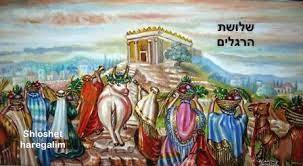
* The Hebrew Bible itself expresses the Jewish Zionist longing, the desire of the Jews to return to their ancestral land no matter what, after they were expelled by the Babylonians from Israel, the same desire that drove their return from their first exile, as recorded in the Bible, and supported by historical documents and archaeological finds. Here's the first part of Psalms 137:
Upon the rivers of Babylon, there we sat, and we wept, as we remembered Zion. On willows there we hung our harps, because there our captors asked us for songs, and our tormentors for joy. "Sing to us from the song of Zion!" How shall we sing God's song on foreign soil?
and here's the craziest thing about this list: there's a good chance I forgot some stuff.
This is posted in honor of the first candle of Hanukkah tonight, and the many Tumblr antisemites, who distort Jewish identity and history by claiming Zionism is incompatible with or has nothing to do with Judaism, people who in the name of anti-Zionism celebrated the biggest massacre of Jews since the Holocaust, who ignore Jews pointing out that anti-Zionism is inherently antisemitic, who prove it by going out of their way to deny Jewish native rights, and who think posting "Happy Hanukkah to my Jewish followers!" (as if Hanukkah isn't a Zionist holiday) covers up their antisemitism.
Happy Jewish sovereignty in Israel holiday to all who celebrate Hanukkah! I hope you really enjoy its foods! xoxox
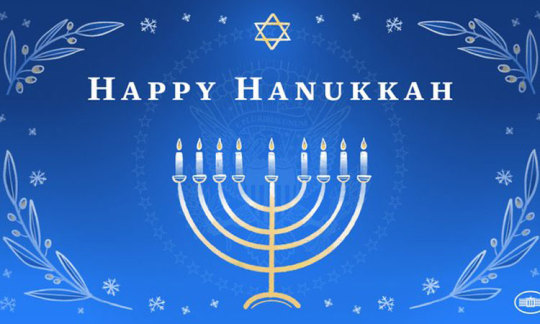
(for all of my updates and ask replies regarding Israel, click here)
#israel#antisemitism#israeli#israel news#israel under attack#israel under fire#terrorism#anti terrorism#hamas#antisemitic#antisemites#jews#jew#judaism#jumblr#frumblr#jewish#hanukkah#chanukah#resources
777 notes
·
View notes
Note
i was so unaware of how much occult conspiracy shit alex jones believes oh my god. i listened to recent levels of knowledge fight and he keeps talking about globalists sacrificing people to saturn???? why
The Saturn Cult is one of those ideas that just kinda congealed out of the early 2000s conspiracy froth of antisemitism, islamaphobia, and renewed interest in alien pseudohistory.
There are a few versions:
The Sci Fi UFO version essentially posits that a particular storm on Saturn, which itself looks a bit like a black cube, is actually a sort of forward base for the Evil Reptilian Empire. This black cube symbology is expressed here on earth as the Kabba (the black square structure that forms the center of global Islam) and Tefillin (specifically the small black boxes worn during some Jewish religious ceremonies.) Thus implying that both Jewish and Muslim people are somehow descendants of /controlled by / loyal to / synonymous with this ancient malicious race of reptillian aliens.
The fantasy occult version posits that throughout all of history, there has been a sort of primordial occult anti-church, who worship a nonspecific ancient god usually associated with the planet Saturn and some vague nonsense about lost Mesopotamian civilizations. This Cult of The Black Cube is supposedly the force behind satanism, the parts about Judaism that Christians don't like, Islam, etc. Basically anything and everything thats bad in the world can be traced back to this ancient secret Cult of the Black Cube.
It's a spin on old blood libel that's been adapted for the modern age. Many modern conspiracy theorists engage in complicated forms of anti/philosemitism that come with modern American evangelical Christianity. There's a lot of "we don't hate Jewish people, because as Christians we are basically Jewish anyway." Or "Jewish people are just Christians we haven't gotten to yet." Many Christian Nationalists like Alex see themselves as participating in Jewish identity in some fashion. Even if they see Judaism as a shibboleth, they often see Christians as "the real Jewish people."
So, modern conspiracy narratives have to make room for this. All the Jewish people you like are the good, pure, human ones that are basically Christians anyway, and all the Jewish people you don't like are controlled by the Cult of the Black Cube. It's the Protocols of the Elders of Zion with some extra room to include the Muslims.
It's also important to remember that Alex thinks magic is literally real in the supernatural sense. He unironically sees himself as a prophet, who is currently at war with actual, literal, demons. And he thinks human blood can be processed and consumed in such a way as to trigger mild superpowers.
607 notes
·
View notes
Text
It may not seem it at first but Judaism is a very earth based religion, it’s very much in tune with nature and even our calendar is based around it.
80 notes
·
View notes
Text
I'm still surprised that I'm ever surprised by Viv's cultural/mythological knowledge and ethics. I've known her to be pretty tasteless and bad at this for years. I guess, my real thought, is how on earth her fans couldn't have known about this. How literally NO ONE in her circle ever knew or said anything/recommended a sensitivity reader ONCE.
--Sensitivity Readers, despite the name, aren't overly sensitive or prudish or totalitarian. You hire them to ask how your story looks/feels and if there is anything abt your story which you don't think is appropriation, but others MIGHT, which is especially important w it comes to portraying foreign concepts, customs, basically anyone else's life experience that isn't yours. And yeah, you go to them for fantasy that "isn't political" because if you know anything about fantasy as a genre, you know there is a lot of intentional to unintentional coding and stereotyping (well that and, you know, portraying cultures and religions that are not your own).
The way Helluvaverse stans are SO quick to turn down any complaints...it's really revealing but also really shocking. Just...how...
How do you NOT know that long/pointy/hooked noses are associated with racist stereotypes? Were you even paying attention to the Harry Potter discourse or did you seriously not think anything was problematic abt that series until 2020?
How do you NOT know that voudou practitioners (not universally) were not happy with Princess and the Frog? You know there were, right? There's backlash/controversy whenever Disney tackles race and culture.
How do you NOT know about bl00d l*bel and greed and how they're antisemitic stereotypes and maybe AVOID making characters coded to be Jewish cannibals and/or greedy.
How do you claim to be a fan of Abrahamic demonology but not also be an (at least passing) scholar of the religions that demonology comes from? Christianity, which is where a lot of our modern idea of demons and devils and hell is based on, is chop full of stuff that's worth your time to study. No; it's not lame or converting you to give it a passing glance. There are so many secular religious scholars who love this shit and make it fun. Then maybe, if you branch off and find people who are interested start depicting things from Judaism and Islam with HELP.
srry I just saw something on twitter where someone was seriously arguing Viv should never had done research on how St. Peter should look. St. Peter is a religious figure, he should be allowed to be depicted in any way-same as Jesus, but the complete lack of care in making him a beardless wonderbread christian pastor man is what's insulting.
tl;dr: Yes, Vivienne- you CAN appropriate Christianity. Also, you should have known that depicted voudou, Judaism and other religions is appropriation w you're NOT part of those groups and done some research.
#cw: mentions racism#vivziepop critical#hazbin hotel critical#if you love dante's inferno or paradise lost then GREAT#but oh my god#KNOW WHAT FIRE YOU'RE PLAYING WITH ESPECIALLY WHEN THAT SHIT ISN'T YOUR FIRE??!?!?!?
41 notes
·
View notes
Note
i have a religon question. we all have indigenous gods, right? especially in 'the east.' do abrahamic religions see these gods as fake, or just another part of god, or djinn and demons? I know there are people who are jewish or muslim or christian living in places with a large population that follows the kind of religion that respects ancestors and hometown gods; do those people also get to pay respects to those deities? do they get a pass for that because they, too, are technically protected by those indigenous gods even though they technically converted, but they're still of that land?
(could that be applied to earth kingdom spirits, bc there's so many of them?)
Hi! You are going to get a MONSTER response here, and it might not even fully answer your question, so... apologies in advance.
I want to start with your premise about indigenous gods. I think there are two elements that strike me as needing some kind of definition or clarification.
The first is: what does "indigenous gods" mean?
Please keep in mind that I am going to discuss indigenous RELIGION here, not "indigenous" as a political term.
I think there is a faulty assumption often applied to conversations around indigenous vs global religions that assumes that "indigenous religion" is polytheistic and "global religion" is monotheistic. One issue with that, in my opinion, is that "polytheistic" and "monotheistic" just aren't as meaningful as Western academia has historically stated. They are, in my opinion (though not only my opinion!), terms laden with Protestant ideology.
Protestantism and "Polytheism vs Monotheism":
Protestant religious scholarship tends to want to divide religion into the more primal, physical religious expression vs the more otherworldly, spiritual expression. Polytheism is, in Protestant academic mindset - excuse my language here, I'm making a point - a kind of barbaric, pre-enlightened, base form of religious expression. When religion gets more refined and intelligent and articulate, it sheds those earthly elements and ends up being monotheistic. This is Protestant in origin, specifically, because it is not only about how Protestant academics viewed religions like Hinduism or European indigenous religion, it's also about how they felt about Catholics and Jews. Catholics and Jews, from that mindset, might be "monotheistic", but they're holding onto the base, unrefined physicality of the old world. Catholics and Jews like physical rituals, physical prayer, rules around eating, etc. So yes, sure, they're monotheistic, but they haven't quite understood monotheism yet.
This is obviously not a nice thing to think about other peoples, but that's not what is interesting for our purposes. What's interesting is that Protestant academia has left much of the West with the above as their understanding of how religion functions. Even many atheists, by the way, will describe atheism as just the next step on that wrung; religion starts with polytheism, which is steeped in physical ritual and is obsessed with the earth, etc, then people became monotheistic and slowly let go of those earthly things, and then people got truly enlightened and realised there's no God at all. You can hear this in how some atheists will talk about believing in "one fewer god" than monotheists - that sense of the arc of progress and development.
Now, I hope you've already realised that I don't believe that's true. But let's break it down a little:
What is monotheism, and what is polytheism?
Judaism often has ascribed to it being the first monotheists. In some ways, that's true; in some ways, it isn't. There were One-God-isms that occurred elsewhere, too. Famously, in Egypt, the pharaoh Akhenaten led a religious reformation which narrowed worship down to Aten, the sun god. Nobody can agree on exactly what this was, but it was at least a focused religious expression. Likewise, Zoroastrianism was talking about a dual nature of reality in a way that could be read as monotheistic before the Jews were.
And when the Jews began to worship God as One, it wasn't exactly a clean break. It's actually fairly clear that the worship of the one we now just call God was really a slow development of theological focus, which we might now call henotheism: belief that multiple gods exist, but only worshipping one. Then that God slowly came to represent a kind of universality, especially with the experience of worshipping a land-based deity while in exile (first exile, starting c.586BCE).
So the Jewish belief in One God is a bit like Atenism: a focusing in on a particular god. Except this time, instead of one big religious revolution, it was a very slow religious development.
And if we want to divide not only into "monotheist" and "polytheist", but also into "indigenous" and "global", we're in very murky waters.
Indigenous Religion and Global Religion
Noting again that this can get politically tense because classifications of indigeneity are politically fraught. I'm interested in what makes a religion or culture indigenous, not in what that means for us politically.
Indigenous religion is difficult to define in a sentence, and so I will not try to do that. Here are multiple things that come together in indigenous religion in general instead: Indigenous religiosity is not distinguishable from culture itself. It's born of a land and developed over time. It might have its own myths about its origin (it likely will!), but those are often contradictory in some ways, because they are descriptions of important cultural narratives rather than histories. It tends to be uncentralised and is often slightly different depending on where you are in the land. It tends toward agricultural spirituality and concepts of holy soil. It is tied to an ethnic group and is generally uninterested in ideas of conversion (either into the group or out of the group); it may even be hostile to outsiders joining.
Global religions, on the other hand, tend to be much more planned-out. A global religion is born from a person or a group of people. One can see its birthplace and origin. It is devised in order to spread, and therefore is not attached to one land or to one ethnic group (so that it can move both geographically and through conversion of others into the group). It tends toward centralisation in an organisational capacity.
So. Is Atenism indigenous? ... Well, kind of yes, kind of no. Worship of Aten is born from the land of Egypt, but having a specific historical revolution makes it seem a little outside the "indigenous" definition. But it's definitely not global either. So we've immediately located something that doesn't seem to work well in a binary sense.
Is Judaism indigenous? ... Pretty clearly "yes". It's a land-based agricultural religion born of a particular land, with strong ethnic ties, that developed over time (rather than being born of a historical moment), that isn't interested in spreading or converting and wants to be in its holy land, is uncentralised and disorganised in nature, etc. But people don't tend to talk about Judaism that way, because Judaism has survived a 2,000-year exile, which is pretty unheard of. Once you've been kicked out of the land that long, it feels like it should be a global religion. But it doesn't fit any of the critera for that.
I think that Judaism being an indigenous religion that learned to survive outside the land is part of the reason that people have such a hard time understanding what Judaism is. It seems, from the outside, like it should function more similarly to Christianity and Islam. But in most ways, it just doesn't.
(Also, it would be remiss of me not to note: there's also a lot of political discomfort around calling Judaism an indigenous religion, because most indigenous cultures haven't reclaimed sacred land after being colonised, and the Modern State of Israel a) exists and b) is acting as an oppressive force. Some people will define groups as indigenous specifically only if they are currently being oppressed within their land of origin. As an academic, I think that's a poor definition, and it's certainly not helpful for defining indigenous religion. But I understand the political discomfort.)
Hinduism is also a really interesting example of this. Hinduism is similar to Judaism in some ways, as it's an indigenous, land-based religion that learned to exist outside of the sacred land. It often gets miscategorised on the basis that it's spread geographically (and unlike Judaism, that spread was not simply by outside force). In some ways, Hinduism acts like a global religion, but it doesn't really fit the bill.
Therefore:
a) "Indigenous religion" isn't always polytheistic (if that's even a meaningful term)
b) Some religions fit into neither category (such as Atenism)
c) Some religions fit into one category but aren't categorised that way by outsiders for various reasons (such as Judaism)
And to add another point: Buddhism is a great example of a global religion. Born of a historical person and moment, ease to spread and convert, not tied intrinsically to land. But try defining Buddhism according to the Protestant theistic categories. I dare you. So:
d) Global religions aren't always monotheistic
"Monotheism" and Global Religions
With that in mind, let's talk about Christianity and Islam. They are the major religions of the world. Christians make up around 30% of the world, and Muslims make up around 25% of the world. And frankly, the 15% of the world who call themselves secular/atheist/etc... I think meaningfully belong to Christianity and Islam, too. I know people often don't like that, but the idea that you have to believe something to belong to a religion is a specific religious idea that I don't ascribe to.
A lot of the time, the way that religion is conceptualised is therefore through a Christian or Muslim lens. (See: my point just above about "faith" in religion.) This has completely muddied the waters of how we discuss and conceptualise our own religions and cultures, let alone other peoples.
Your original question was about Abrahamic religion, so I'm going to try to address that here, but please keep in mind: in a question about indigenous gods, putting Judaism in the same realm as Christianity and Islam is dodgy territory and we need to walk it carefully.
"we all have indigenous gods, right? especially in 'the east.' do abrahamic religions see these gods as fake, or just another part of god, or djinn and demons?"
Judaism: Judaism is an evolution that occurred within Canaanite religion. It started with narrow worship of a local god and slowly universalised, especially when the Israelites were trying to survive outside the place of the local god. The seeds of that universalisation already existed before the first exile, which is likely why it worked. It had a confused relationship with the other local gods; outright worship of those "other gods" was frowned upon but still existed among the peoples, and that worship kind of melded into the narrow worship of the One God. You can see this in how many of the names of God that appear in the Bible are actually the names of the local Canaanite gods.
After the first exile, Judaism became more solid in its sense of theological universalism. Jonah is a great example of this as a book; Jonah was written post-exile (though set pre-exile), and it starts with an Israelite trying to run away from God. It seems absurd to us now, because we know that the Jewish God is universal, but the character of Jonah seems to honestly think he can escape God by leaving the land. The rest of the book is about Jonah's struggle to understand how his god also has a relationship with the people of Nineveh. It's a great example of the struggle of universalising theology.
(By-the-by, I think "universal theology" is a much more useful term than "monotheism", but that's a rant for another day.)
What began as a narrowing ("henotheism"), which was both pushing out and incorporating other local traditions, then had to contend with the worship of the oppressive forces of outside religion. Assyrians, Babylonians, Greeks, and Romans are all peoples who attacked, colonised, exiled, etc - and they all came in with their gods. The Greeks even instituted worship of their gods in our Temple. Our worship was made illegal by the colonisers. Relationship with "idol worship" was about relationship with those outside forces.
In short, the literature itself is very confused about what those gods actually are. Jews were certainly not supposed to worship them, and should go to great lengths to avoid them. (If we didn't, we probably wouldn't still exist, so: good shout.) Sometimes they get talked about like neighbouring gods, which is a holdover from the narrowing-days (where those other gods existed, but we worshipped our own native land-based god). Sometimes they get talked about as false idols created by people who are either misunderstanding reality or deliberately trying to have control over the divine (which developed more as the God-worship was universalised). The more universalised our theology became, the more we started shrugging of ideas of neighbouring gods that actually existed, and the more it became about the latter.
(Note: When Jews met religions that call a universal God something else, they would then tend to conclude that it's not idol worship. This developed when Judaism met Islam in more peaceful moments. The idea that non-Jewish religions could be something other than idolatry then came to include Christianity - but only kind of, because of the worshipping-a-person issue - and then religions like Sikhism much more easily. It's even arguable that religions like Hinduism aren't exactly "idol worship" for non-Jews, because many Hindus will describe what they believe in in universal terms - Brahman is first cause and all emanates from him - even if their worship includes references to "multiple gods". This does not mean Jews are allowed to worship that way.)
Christianity: Christianity was born in a specific historical moment, utilising previous Jewish and Hellenistic thought. It almost immediately became a religion of conversion (I would put that distinction at the year 50, with the Council of Jerusalem). Since it was born from a universalised theology, it already had the bones of the idea of a universal God; now, it also had the will to spread, both geographically (shrugging off major religious ties to the Holy Land) and religiously (not only could people convert, but people should convert). While Judaism was all about avoiding worship of other gods, Christianity became about converting those peoples.
Islam: Islam was born in a specific historical moment, utilising previous Christian, Jewish, Zoroastrian, and pre-Islamic Arabian thought. It immediately became a religion of conversion. In this sense, it's a lot more like Christianity than anything else, except Christianity developed most significantly after the death of Jesus. Islam got a lot more time in development with Mohammed. In some ways, I think this really benefitted Islam (though that's not to say some things didn't get... complicated, upon his death). It inherited from Christianity the sense that worship of other gods was something to be responded to with conversion.
"I know there are people who are jewish or muslim or christian living in places with a large population that follows the kind of religion that respects ancestors and hometown gods; do those people also get to pay respects to those deities? do they get a pass for that because they, too, are technically protected by those indigenous gods even though they technically converted, but they're still of that land?"
Short answer: no. Jews, Christians, and Muslims do not believe that those deities exist as separate to the universal God.
Longer answer for Judaism, because... well, I know more about lived Judaism than lived Christianity or Islam*:
(I recently said to someone IRL: I do have a degree in Catholic Theology, but I don't know anything about what Catholics ACTUALLY believe.)
It would be absolutely disallowed in Judaism to participate in worship of "other gods". Modern Jews will not believe those gods exist (at least, I've never come across that either IRL or in studies). However, Judaism does still hold that worship is a powerful thing and that Jews are not allowed to participate in worship of "other gods". Many Jews will say it's not worship of "other gods", it's just worship of the one universal God that is understood differently by different cultures. This does not change the fact that Jews are not allowed to participate in it.
(In fact, it's one of the three things a Jew should rather die than participate in. It's a little murkier than this, but basically: even under duress, even on pain of death, a Jew should never murder, commit sexual violence, or worship an idol.)
"(could that be applied to earth kingdom spirits, bc there's so many of them?)"
Yes, I think the Earth Kingdom in ATLA is supposed to function in an indigenous manner, specifically in indigenous religion as it acts over a wide spread of land. That is to say, like Hinduism, or like when you compare different arctic indigenous cultures or African indigenous cultures. There isn't a centralised force (like with the FN); it's local gods - or here, spirits - that have their own myths, etc.
Please note, I have avoided talking about nomadic cultures here on purpose, because this would be twice as long! This is not exhaustive at all. I hope it makes at least some sense.
#jew on main#judaism#christianity#islam#buddhism#hinduism#it's a world religion extravaganza#canaanites#not the kindest post to protestants#atenism
115 notes
·
View notes
Text
Historian's Perspective on Vulcan Time Zones
This was supposed to be a quick response to something on a Discord. As you can see it turned into 750 words on the history of Earth time measurement, time zones, and my opinion of how and why Vulcans would use time zones. If you're into Vulcan vs Human cultural minutia, enjoy diving down this rabbit hole with me!

Vulcans, with their canon innate sense of time, would in fact still have time zones - but they wouldn’t use them the way we do today.
Here on Earth, time zones were a secondary effect of trains. Before trains, people had a lot of different means of telling time, but they mostly revolved around dawn and dusk. You can still see that today in Jewish and Muslim timekeeping. We’re in the month of Ramadan right now. Fasting is from LOCAL dawn to local dusk, not the time of those events in Mecca. Shabbat starts at local dusk on Friday night. The whole idea of tying human time to precise minutes would be nonsensical for pretty much everyone living before the industrial revolution.
Hours also used to be variable in length, based around good old dawn and dusk. So for the Romans the “first hour” was literally the first hour after dawn. They divided the daylight into 12 hours (because Sumerian math is persistent AF). During summer, one “hour” was about 75 modern minutes long, while during winter, one hour was 45 minutes long. An hour was a division of daylight, not a collection of minutes.
Up until the industrial revolution this was fine. If you needed precise timing for a chemical reaction there were surprisingly accurate measuring devices, but those weren’t applied to everyday life.
Christian church bells and Muslim Adhan calls to prayer followed the dawn to dusk modified hour system to let people know what time it was. In Christian literature, you find a ton of references to different churches hourly bells tolling for a solid 3-5 minutes back to back.
It was part of the rhythm of the day. Many church clocks didn’t even have minute hands, because yo didn’t need them. In daily life, you honestly didn’t need to know anything more precise than “half” or maybe “quarter” past a specific hour.
Time zones as we know them were literally invented by train companies. It was the only way to ensure the trains ran on time. You can find tons of contemporary writing about how “two of the clock” could mean damn near anything. If you’re trying to get meat butchered this morning in Chicago to New York city on quickly melting slabs of ice so it’ll arrive in time to be taken to shops and sold before it spoils, you really need your trains to run on a dependable schedule.
So I say:
1) Vulcans would have time zones because they are the most logical means of scheduling long distance transportation and distribution.
2) Local time has little to do with time zones. Vulcans in canon have an innate sense of time in a way we humans do not, so really, the point of time zones is just ensuring transportation and distribution networks are efficient.
3) Nimoy infused a lot of Judaism into the lore of Vulcans. As such I think their innate time sense would also be tied to a dawn-to-dusk schedule. (The modern idea of starting a new “day” in the middle of a late night sleep cycle is very weird and totally ahistorical.) Therefore Local time is still linked to dawn and dusk. It’s also useful to know what time dawn and dusk are for people halfway around the world. That way you can efficiently schedule meetings with them at mutually convenient times. Once more, we come back to time zones.
If you want a real world example of how No Time Zones fucks you up, look at China. There is officially One Time Zone in all of China, even though geographically it would be cut into 9 if you followed the same lines everyone else uses. That means a normal meeting at 10 am for someone in Bejing is at what we would consider 1 am at the furthest point west. But 1 am is legally “10 am” for them. If you don’t have to deal with Bejing on the regular, then the clock numbers have zero correlation with the way people in those places actually live their lives.
I suspect what a lot of people really object to is daylight savings time.
Vulcans who use local dawn and dusk to define their days would find this equally nonsensical.
Now if you want to get weird with it, you could make all VSA starships use ShiKhar Central Time, regardless of where the crew is from.
#Vulcans#Time Zones#History of Time#Literally a short history of how people in the west measure time#plus how I think Vulcans would measure time#star trek#vulcan culture#my headcanons
12 notes
·
View notes
Text
blessing after meals

Image description. Screenshot of blessing after meals in English with a leaf green background. Text is lower in post. Bottom left has handle in black, bottom right has red chop, and right side has a budding almond branch.
this is in my tu bshvat haggadah post, but deserves to have its own separate post to shine. I wrote this today to focus on human connections and natural wonders as our blessing after the meal.
Blessed is all Being, for sustenance and nourishment, the vine and the tree and their fruits, the fruits of the field, the land we live on. May we remember and be remembered by Mercy, and guided by Justice to restore our love for each other. May Compassion rebuild our human family speedily and in our days, so we see each other as holy, and rejoice in each other.
Let us eat together at one table of abundance, where we bless each other, all beings, and the earth, the waters, the sky. Let us always remember and give thanks for the wonders of the cosmos, for the stardust above and within our shared blood, the flowers before us and within us all. Let us be one interconnected family. May it be so.
#judaism#jewish#jewish magic#jewitch#witchcraft#siddur#earth based judaism#queer jews#secular jew#blessing#blessing after meals#birkat hamazon
29 notes
·
View notes
Text
Honestly going to Israel kinda fucked me up in ways I'm still just beginning to unpack, because now I'm questioning the very meaning of "home."
I want to preface this by saying this is not about politics. I am not trying to make a particular political statement, nor is this commentary on or a reaction to any particular event or whatever. This is springing from a deep, primordial mental and emotional place that I can barely name or explain, let alone change or control. I honestly don't even feel like it's coming from a particularly religious place, although Judaism is the only language I have to even begin to attempt to explain it. You know how various animals just know certain migration stopping points that they've never been to or how to navigate back to the place they were born to have their own young? This feels far more like that.
I've definitely never felt anything like this before. Growing up, I felt a generalized connection to and love of nature writ large. It was very much a "the earth is a wide, wild, diverse, incredible place that must be loved and respected and cared for" rather than some deep tie to the particular land I grew up on.
In fact, the natural space I felt the most spiritual connection to and in was not where I grew up at all, but rather the Great Lakes area that my family traveled to on vacation. I grew up longing for the shoreline and woods of a place I'd only been a few times for a comparatively short period of time in my life, because I'd fallen in love with it. When I finally got to touch that water again as an adult, I greeted it like an old friend, and it lapped over my hands as if to return the favor. But I'm not actually from this area, and the way that it calls to me is one of possibility - this could be home, someday. Maybe.
It was only as I've gotten older that I've started to realize how deep the prairie lives in my subconsciousness. This was the local natural environment I grew up in and time has taught me appreciation for it. It shaped me. It left an indelible mark on me. Some part of me will always carry it with me, no matter where I go. Some part of me will always be the prairie, the flat farmlands and endless sky above, the deciduous woods, the ever-changing seasons and unpredictable weather. Some part of me will always taste the specific scent of rain on sun-ripened garden tomatoes, of sweet corn in July, will always feel the specific sun of the heartland on my face.
And yet, it does not own me. I carry it with me wherever I go and it will always be a part of me, but it does not lay claim to the very fabric of my being.
Israel, on the other hand.
I did not expect this. In fact, I was very wary going there, of it being a bit of a letdown. I fully expected that I would feel moved by seeing the sites, of going to these historical places, of finally seeing the place that so many of our prayers are about. I hoped I would enjoy the experience and find myself reconnecting with Am Yisrael and repairing some of the damage to my Jewish connections that Covid had brought on. I hoped I'd have fun, that I'd learn some things, and feel a spiritual connection. At worst, I was worried it would be extremely foreign and off-putting; that I would not be particularly moved religiously while there and/or that the kind of Judaism and Jewish community there would be so alien and unfamiliar that it would actually make me feel even more cut off from Jewish community.
Those were the possibilities I anticipated and was prepared for. All rational assumptions, based on the facts I had in front of me and my knowledge of myself.
What I was totally unprepared for was feeling like the land owned me the moment my feet touched the ground and that I would come back to the US - to the only home country I've ever known, where I was born and raised and have lived my whole life, where my family and friends live, to my house with my beloved partner and the beautiful life we've built together - incomplete, having left some essential part of my being there.
And it's not like this trip was all warm fuzzies. It was still a foreign country where I did not speak the language and where I was not acculturated. It was awkward in all of those ways. I'm not sure I would want to live there in a permanent sort of way; it would definitely make the way I prefer to practice Judaism difficult. I am quite sure that if I moved there even temporarily, I would quickly get quite homesick for being in a place where I'm not a foreigner, where I speak the language fluently and where I know lots of people. I'm certain that the culture shock would hit me like a ton of bricks and it would be very difficult to push through.
But.
Ever since returning, home has not felt the same. These places that I've lived my life in - that until this year I felt mostly comfortable in and like I was part of this culture - it's like I peeled the layers of reality back to reveal how much of a fish out of water I am here. It's still unclear to me if this is because I changed, or because I never truly belonged. I could definitely make solid arguments for both, but I'm not sure it matters much. Heartbreaking either way, to be honest.
What's frustrating is that it's not like I just felt totally at ease there. It wasn't like I entered this magical, perfect space where I suddenly made sense as a person and felt immediately comfortable and at home. It's still a foreign country, on a different continent, in the middle east. I was, and am, a ger. In every sense of the word.
But it's not about medinat Yisrael; it's very much an eretz Yisrael thing. Regardless of how I feel about it, something about eretz Yisrael has a claim on me that I didn't understand until I went there. The land doesn't in any sense "belong" to me, and it wouldn't even if I made aliyah and purchased a house there. I belong to it in some way that is as real and concrete as it is ephemeral and impossible to explain, no matter where I live or go.
This longing to return home, to end the diaspora, to bring about Olam HaBa - so much of our liturgy - it now makes sense. I didn't get it before, but now I do, and I really don't know how to process this information.
How do I explain this to myself, never mind anyone else? How do I explain that a Protestant-raised white-bread kid from the US who has no known Jewish ancestry and who converted as an adult on nothing but a shot-in-the-dark spiritual longing and numinous experience of the Divine, could go to a country where I am very much an outsider and a foreigner, and have it grab me by the kishkes and say hey - this, too, is part of your covenant. You will be held to your word. You belong to this place now.
Tisha b'Av hit so much harder this year for that reason, and I predict a lot sobbing in shul during the chagim.
Galus, indeed.
#you can reblog but don't be a jerk please#ארץ ישראל#this post was definitely prompted by visiting my home state and it feeling like home... but also not#and this isn't the only reason why#but it's definitely a large part of it
263 notes
·
View notes
Note
> gets gender affirming surgery
> hates trans women
make it make sense
normally I try to be polite but I've had an absolutely shit day and honestly, you're fucking vacuous beyond what I previously thought possible, so fuck that.
BOTH of those are factually incorrect assertions I have extensively addressed with great detail on this blog on multiple occasions, but you sent this ask without doing even the slightest bit of informing yourself about me or my views. you could have answered your own question lmfao. again, absolutely brainless.
my bio says "got top surgery as a proud woman." y'all believe woman is a gender (I don't, for the record). so if woman is a gender, and I call myself a woman, and "top surgery" is considered gender affirming for "non-women," then what someone needs to make sense of is how on earth you think that my elective mastectomy served a "gender affirming" purpose. this is a tier of irrational stupidity that earnestly causes me to feel a deep dread for the future of the species.
I don't hate trans-identified males, and I have broken down why that narrative is straight up BS propaganda nonsense many times, and I have dived onto the nuance about this and about my feelings toward trans-identified males many times. I hate many trans-identified males I have interacted with or read the misogynistic ramblings of, but I hate them for their misogyny in exactly the same way I hate any other misogynist. I do not start out by hating them for being trans-identified. I start out giving everyone a fair chance to be a decent person (unlike y'all lmao). If it seems like I hate trans-identified males just off rip BECAUSE they're trans, either you're misinformed by your own propaganda/making assumptions OR there might be a bit of a misogyny problem in the modern trans community that causes me and many women to wind up hating a large number of trans-identified males for being misogynists, but instead of perceiving that that's what's happening, y'all will just point and screech at the evil witches bc doing the former requires a modicum of critical thinking. it's just so much easier to shout "feminazi bitch!" and call it a day, isn't it?
If you really think that there's just no possible way that other people could simply not subscribe to gender identity ideology without it coming from a place of hate, you've crossed into religion. "Atheists are inherently on Satan's side" type mindset fr. I don't subscribe to Judaism as a religion, and actually have outright criticisms of patriarchal religion, but I've never heard anyone claim that not being religiously Jewish (or even having criticisms of Judaism) makes one antisemitic. In fact, I'm pretty sure we all know that you can do that and still be actively opposed to antisemitism and fight against it. I mean, my wife is Jewish (by blood, not practicing) and shares those exact same criticisms of the religion itself. Yet the narrative we're all supposed to believe without question is that you either fully subscribe to gender identity ideology - which is inherently faith-based* - or you must hate trans people; you must literally want trans people dead.
*It is inherently faith-based because the foundation of gender identity ideology is how people feel. We are required to accept a male's "I feel like a woman" as proof that he literally is a woman, and that his motives are pure must never, ever, ever be questioned - even if this male does nothing to "transition," is wildly misogynistic, openly fetishizes his perceived womanhood, and/or blatantly takes advantage of being welcomed into women's spaces.
We are required to reject material reality and the actual definition of "woman" in favor of the materially meaningless circular definition "a woman is anyone who identifies as a woman." We are not allowed to ask for clarification as to what exactly he is identifying with that indicates womanhood.
We are expected to fully accept and preach the Gospel of Gender Identity: Every person has an innate Gender Identity. If one claims not to have an innate sense of Gender Identity, that person is either a liar or simply wrong about their own internal experience (note that this is the ONLY time it is okay to question someone else's internal identity!), and we are encouraged to "correct" the individual in question. Everyone can be accurately categorized as either Cis or Trans. Not only does everyone have an innate Gender Identity, but we are born with these - but also, your gender identity can change over time or be fluid! Everyone has an innate Gender Identity, but also, gender is inherently fluid. And above all else, one's Gender Identity must absolutely NEVER be questioned no matter the circumstances.
17 notes
·
View notes
Text
THEOLOGY
ABRAHAMIC RELIGIONS ->
THE THREE MAJOR ABRAHAMIC RELIGIONS are, in order of appearance, JUDAISM, CHRISTIANITY, and ISLAM, but there are other MINOR RELIGIONS.
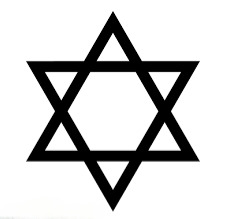
■JUDAISM is an Abrahamic monotheistic religion based on the covenant shared between God and Abraham.
The holy scriptures of JUDAISM are called the TANAKH, after the first letters of its three parts in the Jewish tradition. T: TORAH, the Teaching of Moses, the first five books. N: NEVI'IM, the books of the prophets. KH: KETUVIM, for the Writings, which include the psalms and literature for the wise.
ORTHODOX JUDAISM is the belief in a strict interpretation of Jewish law, which should be grounded in the Torah. As such, the revelation given to Moses from God on Mount Sinai is made glorious and just.
CONSERVATIVE JUDAISM is the belief in marriage and membership as a Jew. Other characteristics will include support of the Zionist movement and the rejection of the immutability of the "Torah" and the "Talmud" while still having faith in the eternal truth upon which it is based.
REFORM JUDAISM is the belief of the renewal in our living Covenant with God, the people of Israel, humankind, and the earth by acknowledging the holiness present throughout creation – in ourself, in each other, and in the world at large – through practice that will include reflection, study, worship, ritual, and much more.

■CHRISTIANITY is an Abrahamic monotheistic religion centered around the birth, life, death and resurrection of Jesus Christ.
THE BIBLE is the holy scripture of the Christian religion, purporting to tell the history of the Earth from its earliest creation to the spread of Christianity in the first century A.D. Both the Old Testament and the New Testament have undergone changes over the centuries.
□ROMAN CATHOLICISM
Roman catholicism is a branch of Christianity which has its belief about the sacraments, the role of the Bible and tradition, the importance of the Virgin Mary and the saints, and the papacy.
HISTORY OF THE REFORMATION
THE REFORMATION was a reform movement in religious belief that swept through Europe in the 16th century. It caused the creation of a branch of Christianity called PROTESTANTISM, a name used collectively to refer to the many religious groups that separated from the Roman Catholic Church due to their difference in doctrine.
□PROTESTANTISM
Protestantism is a branch of Christianity which will deny the universal authority of the Pope and affirm all of the Reformation principles of justification by faith alone, the priesthood available to any practitioner, and the Bible as the only source of revealed truth.
□QUAKERISM
Quakerism is a branch of Protestantism
Follow your "inner light"
The Bible
Equality for all
God is accessible to everyone
No clergy
No religious ceremonies
No sacraments
LOCATION -> England
WHEN -> 17th Century
Adventism
Anglicanism
Anabaptism
Baptism
Irvingianism
Lutheranism
Methodism
Moravianism
Pentecostalism
Waldensianism
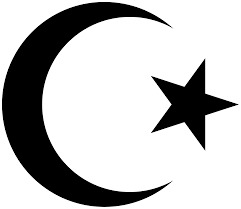
■ISLAM is an Abrahamic monotheistic religion that was revealed to Muhammad, a prophet of Allah, and written down in the Qur'an years later by his followers.
SUNNI
Muhammad did not specifically appoint a successor to lead the Ummah before his death. This sect did, however, approve of the private election of the first companion, Abū Bakr. In addition to the previous mentioned, Umar ibn al-Khaṭṭāb, ʿUthmān ibn ʿAffān, and ʿAlī ibn Abī Ṭālib are also accepted as al-Khulafāʾ ur-Rāshidūn. After this, they believe that Muhammad intended that the Muslim community choose a successor, or caliph, by consensus. A practitioner of this sect will base their religion on the Quran and the Sunnah as understood by the majority of the community under the structure of the four schools of thought. These are HANAFI, MALIKI, SHAFI'I and the HANBALI.
SHI'A
Muhammad's family, the Ahl al-Bayt, including all of his descendants, have distinguished spiritual and political authority over the community. It is believed that Alī ibn Abī Ṭālib was the first of these descendants and the rightful successor to Muhammad. As a result, it was rejected that the first three Rāshidūn caliphs have legitimacy.
------------------------------------------
ETHICAL RELIGIONS ->
THE THREE MAJOR ETHICAL RELIGIONS are BUDDHISM, TAOISM, AND CONFUCIANISM.
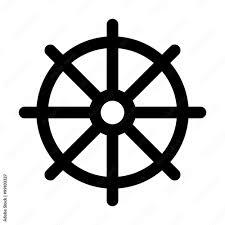
■BUDDHISM is an ethical religion that was revealed by Siddhartha Gautama for anyone to gain spiritual enlightenment if that person followed the eight-folded path along with a personal commitment to any noble truth given to him/her through the journey of life in order to reach nirvana.
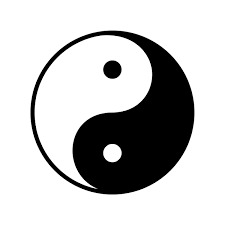
■TAOISM
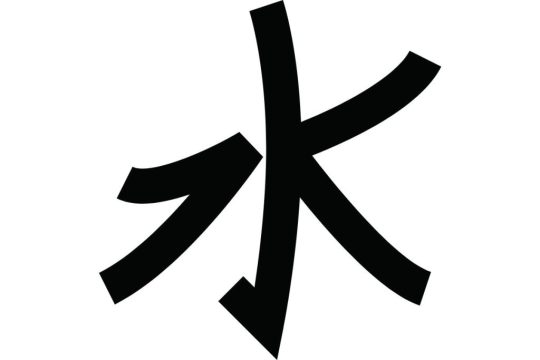
■CONFUCIANISM
15 notes
·
View notes
Note
do you known why nazi satanists (like jos) are so obsessed with enki being satan? ive also seen it floating around in Non Nazi Satanist spaces on like TikTok but im not sure I understand it. if you want to worship enki wouldnt you just do that? where did this originate, it feels like a newer thing but its in several different circles maybe????
There is a sort of idealogical split among modern fascists. There are the traditionalists, who see early Christianity as the Based Traditionalist Religion, and the anti-modernists, who see Christianity as "Cringe" for both it's integration into so much of existing modern power structures, and it's proximity to Judaism. (They're Fascists, it's all about feeling and emotions, not reality.)
(gonna tag this next paragraph as my opinion)
They play up the proto-christian, proto-jewish influences of Satan, because it further distances their ideology from existing power structures. In their minds, both Christianity and Judaism are depraved symptoms of modernity, and they want their theology to be as far from that as possible.
Take the example of a neo-nazi converting to extreme Traditionalist Islam (one of the most anti-modern fringe theologies on earth) only to kill his neo-nazi roommates for "disrespecting his religion."
This example is frankly a bit insane-sounding from the outside, but it's to illustrate that the actual dogma of religion is not all that important to reactionaries. All that matters to these types is whether something is "based" or not. It is an entirely emotional engagement.
441 notes
·
View notes
Text
Since I'm going insane from pointlessly arguing with braindead people and propagandists on here, I'm just gonna give my ten cents and leave this conversation, maybe even the site for a little.
I want Israel to stop murdering civilians.
It's as easy as that. Just stop.
All the defendants of the undeniable genocide I've argued with over the last days and weeks had very little of an excuse really, I believe that comes from them knowing that the sole and only reason for what is happening in !Palestine! and what Israel is doing there comes from their tora saying that it's their "promised land" and they have any right to own it.
Excuses were, for example, that Hamas started it; alright, even if, that doesn't make the murder of children and civilians less horrifying and doesn't say anything.
It was originally Israel and Palestinians are the settlers; what the fuck is your point here even if that was true?
And to the "promised land" thing:
We, as humans, are nothing more than a disease. A virus destroying our host we called earth. I, as many others, wish we could rise to be more, but I don't think we ever will surely are not right now. You religious people's fragile egos just can't handle the meaninglessness that is our existence, but it is the truth, sorry to tell you.
Religion is stupid and dangerous and if you still believe in your imaginary friend and what he promised to you, you are either too indoctrinated, too stupid or too narrow-minded to think outside of the box beaten into your head.
It's a relic of a past when people thought the sun was circling the earth and thunder was the wrath of some superior being, that we are the center of everything, when in fact we are riding a tiny crumb of dust through a incomprehensibly large universe.
Before you cry out "antisemitism", I don't care what bedtime story your parents told you, I don't differentiate in "Jew", "Muslim" or "Christian", I just call it religious and I will still treat you like a human being and in no way different than any other person. Same goes for your place of birth by the way. Idgaf if you are from the US, Spain, Japan or the fuckin south pole and I surely don't care for your skin color.
Some of you people on the other hand treat people as subhuman or as someone who doesn't belong somewhere based on their religion or origin, since YOUR religion or YOUR leader says so, e.g. christian crusades, diverse acts of terror, the colonization of America or recently Russia or Israel.
That's where I draw the line and if you defend that, you are not only stupid, but unnecessarily supporting ruthless murder and I will stop treating you as a human being.
My opposition against Israel is not a thing about religion. They made it a thing about religion by painting the star on their flag and setting it equal to Judaism to make it easier to scream "antisemitism" towards any critic. It's about people being treated terribly and being killed for absolutely nothing while having no options to flee or surrender.
Nothing matters.
The universe doesn't even notice us in the slightest.
The earth still turns and it will keep rotating around the sun.
Those deaths mean nothing. Israel means nothing. Judaism means nothing. Humanity means nothing.
They are dying for absolutely nothing.
Just stop.
Not just Israel, but all wars, all unnecessary violence.
It's all pointless.
4 notes
·
View notes
Text
there's a part of me that i always hope that jewish zionist (christian zionists can just die) will come up to their senses that like... their views are rooted in severe trauma and the cycle of violence that jewish people experience world wide lead many of us to idealize a society where all of us would want a society or a community were we all feel kinship (Israel) but this aspect of community isn't healthy nor realistic. the only homogeneous jewish community are so due to violence committed onto us where we are pushed to these corners and fringes of society.
And to act as if Israel isn't the same, except here we are continuing the violence promoted onto us after we are ousted from our place in society is very sad. i personally know people who have left israel after realizing that and it makes me so sad to see the trajectory of their lives especially after some of them were forced to join the idf or fleed the country to avoid it.
its really like... many zionists exist in a sphere where the violence inflicted upon them (and their ancestors and relatives and friends) has become a deterrent to see the world as something we can repair, and that is very sad to me because, to me, that judaism is a religion and a culture that is based on acceptance and survival and living, and sending young children to war to kill other children is the antithesis of it. you continuing a cycle of violence that will never achieve anything else other than seeing your fellow jewish people be pushed out of society over and over again.
i just hope one day every jewish zionist can remember that all of us have two rocks in our pockets. one has 'the world is for me' and one has 'the world is for everyone' written on it, and both of these rocks keep us grounded on this earth.
maybe this anti-zionist perspective is based on my personal experience of/in/about israel, but i think jewish people are better than to be the mouth pieces of christians zionists who will toss us to the wolves in their own communities so that we can do their dirty work over sea
the fact that you were/are victimized and have lost family/community members has pushed to you to recreate this violence, and i am so sorry you are not realizing this, and i hope one day you do so that its not too late.
#did you know the idf tried to hunt down my friend and she had to flee to south africa#i think a lot of tumblr zionists have never been in contact with the idf and it shows!#i hope you never come anywhere near the horror of this group as much as they sure love to support them
5 notes
·
View notes
Note
Why not just eat chocolate? Nobody will know and not eating things you like because of a religion seems kind of cruel? Obviously I get the pork thing - even though that stems from the time Piggys were gross and ate poop - but to not eat chocolate because men 3,000 ish years ago said 'Only eat simple bread and starve yourself" said so?
It just seems so wrong 😕 Religion should be about you and your god, not what people a long time ago said you can or can't do. I have this problem in my own faith. By rights I think it's a period of not indulgence is here or coming shortly. Yet I'm pretty sure main event guy wouldn't want people starving and whipping themselves over him. 🙄
80% of religions these days it going by what some man wrote or decreed, rather than about god and that is a giant same.
Please eat your eggs if you want. You shouldn't have to restrict yourself on word of what a group of men who lived 3000 years ago said.
there are so many things wrong with this ask but you sound so genuine and earnest and im just so fucking pissed right now that i have no choice but to answer asks in this horrible awful no good very bad new post format that im gonna make this brief.
1- i know i dont talk about it much anymore but i have my masters in jewish education and up until last year was working as a bar/bat mitzvah teacher and torah reader in my synagogue for the last like million years of my life. religion has never felt like a burden to me.
2- not eating piggies although its plausible does not necessarily come from the fact that theyre in close contact with poop. doesnt say anything about that in the biblical texts. keeping kosher is also not the same as the dietary restrictions for passover and the reasons for them are not necessarily related.
3 - not eating certain things (chametz - not "simple bread," its more complicated) on passover is not about starving yourself and its not about atonement (that holiday is in the fall), its about remembering important events in jewish history and keeping the sense memory of those events and lessons alive for thousands of years.
4- what religion is asking you to whip and starve yourself for god? sounds like a cult or a dan brown novel tbh
5- judaism is definitely based on shit some men wrote, but it most certainly was nowhere close to one man. we're talking lots and lots of very opinionated and highly intelligent and insightful men (also women if you know where to look, also some dumbass men) whose interpretations and decisions of law regarding how their society and religion could and should function without a central community or authority on earth were passed through millions of hands and thousands of more opinions through the centuries and enforced to many degrees in both extremes only to be falling apart in the last century or so thanks to inescapable global factors that have rolled through our disparate communities like indy's boulder on a rampage.
wait a minute i said this would be brief. fuck.
anywaynot eating my cadbury creme eggs is def not a burden i just enjoy complaining its probably all for the best.
also i hope this didnt come off rude i understand where you're coming from but i also invite you to do a little googling about judaism and the holiday of passover. happy holidays! ✡️🫓🍷
#jewish things#judaism#passover#personal#thoughts out loud#nice people#food mention cw#again i wasnt trying to sound antagonistic but please. religion is not always evil.#💗💗💗#wait wait#i also have to add that#many things we enjoy can be found in a kosher for passover version during the holiday#im sure if there was enough demand for cadbury creme eggs during passover someone might make it simply for the $$#unfortunately that will most definitely never happen s;dklfjgksdhfngjkfdh#but there is plenty of chocolate available to me on passover should i decide i need it#(i am not generally a chocolate girl. i just go through a yearly creme egg phase is all)
25 notes
·
View notes